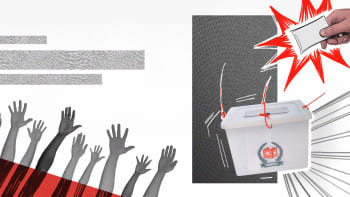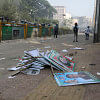For every rally, there is a counter-rally

The political situation in Bangladesh seemed to face a new twist at every turn throughout last week, till it culminated with BNP's grand rally on Friday, followed by its demo at Dhaka's entry points the next day. We don't know what will happen in the coming days, but it is evident that they will be challenging, with the political parties sticking to their guns – "election only under Sheikh Hasina" versus "election only if it is without Sheikh Hasina." The prevailing practice of the ruling party announcing programmes to counter those of the main opposition camp, confrontational as it may seem, appears to be testing the strength of Awami League's party machinery.
As things led up to an imminent showdown, there was anxiety all around about what would happen. It began with BNP announcing a rally on July 27, followed by Awami League's youth wing Jubo League rescheduling its rally, previously set to take place on July 24, to July 27. On July 26, however, the Dhaka Metropolitan Police (DMP) said it would not allow any party to hold rallies on a working day to prevent public suffering, and suggested that BNP hold its rally in Golapbagh, the same ground where the party held a rally on December 10 last year. BNP refused and held an emergency meeting. It was at this time that Awami League's student wing Chhatra League said they wanted to hold a rally at Dhaka University, while Jubo League wanted the old trade fair ground in Agargaon for Thursday. At 9:30pm, BNP announced that it would hold the rally at its preferred venue, Nayapaltan, on Friday – the weekly holiday. Soon after, the Awami League fronts decided to follow BNP's footsteps and postponed their programmes to Friday, to be held at the south gate of Baitul Mukarram National Mosque, not too far from Nayapaltan. Police gave both parties permission to hold rallies under 23 conditions.
There were a few things, both good and bad, that stood out during these two days of political hyperactivity.
Both parties held mammoth rallies peacefully on Friday. Tens of thousands of party workers and leaders made their way to Dhaka, but there were no incidents of clashes between the two rallies, despite close proximity. This indicates that both parties have the capacity to hold peaceful rallies if their leaders will it, as they did this time. In other words, when people's safety is at peril due to political turmoil, it is probably because the politicians do not care, not because law enforcers are not working hard enough.
Although it happens to be a prevailing practice, this culture of "counter-programme" only indicates moral insecurity. Sure, BNP did the same when it was in office, but perhaps it was because of such pettiness that the party has been out of power for the last 16 years. It is not befitting for a party like Awami League to copy BNP's tactics on the field. Such tactics are only making the party an object of ridicule. One need only look at the jokes and memes being shared on social media to get an idea of the public's reaction to this practice.
So, what if BNP holds a huge rally? One or two huge gatherings are certainly not enough to pose a threat to the government. They certainly attract attention and people sit up to listen to what those on the streets have to say. But there is another aspect to the story. Take the divisional rallies for example. They gained a lot of attention and media coverage specifically because of the obstacles on their way, and it made for a great story of the underdog. If the government had not put up those obstacles, the divisional rallies would have garnered far less media attention and enthusiasm. The fact is that putting up obstructions to prevent opposition activists from coming to a rally ends up attracting media coverage.
Both parties held mammoth rallies peacefully on Friday. Tens of thousands of party workers and leaders made their way to Dhaka, but there were no incidents of clashes between the two rallies, despite close proximity. This indicates that both parties have the capacity to hold peaceful rallies if their leaders will it, as they did this time. In other words, when people's safety is at peril due to political turmoil, it is probably because the politicians do not care, not because law enforcers are not working hard enough.
The police's role, unfortunately, has become blatantly partisan. They set up check-posts at Dhaka's entry points and searched vehicles to see whether BNP men were coming to join the rally. But at the same time, vehicles carrying Awami League men were allowed to enter the city without any delay.
During the search, police officials checked people's mobile phones, violating their right to privacy. Some people found to have photos or texts related to BNP rallies were detained, and some were even arrested. This was further proof that the police were not being neutral. BNP announced at Friday's rally that it would hold sit-in demonstrations at the capital's entry points on Saturday. That evening, Awami League said it would hold peace rallies at the entry points, too. At midnight, the DMP denied permission to both parties. But BNP said it would observe its programmes anyway. In the morning, we saw police and the ruling party's members taking their position at the entry points. There were clashes between the BNP, Awami League, and police. Awami League's presence at the same locations where BNP would stage its sit-in naturally led to clashes. There were contrasting scenarios in the treatment of BNP leaders picked up from the streets. A formidable student leader who went on to become a BNP stalwart, Amanullah Aman was assaulted by police and then admitted to a hospital. The prime minister sent her personal assistant with a fruit basket to enquire after Aman's treatment and condition. This is the kind of camaraderie and warmth that people wish their politicians always shared instead of acting as eternally embittered rivals.
On the other hand, there was the case of Gayeshwar Chandra Roy, a BNP leader was beaten mercilessly as he fell on the street. Bleeding from the temple and unable to walk, Gayeshwar was helped into a police vehicle, which took him to the police hospital and then to the Detective Branch headquarters for lunch. Pictures and video of his sumptuous lunch with DB chief Harun-or-Rashid were leaked on social media and went viral, perhaps in an attempt to embarrass a senior politician.
It has been many months – years, in fact – since the streets were crowded with political rallies. It was after many years that the two archrivals seemed to go head to head. Their limitations notwithstanding, it is this perpetual rivalry between parties that might eventually strengthen our democracy and the institutions that safeguard it.
Mohammad Al-Masum Molla is chief reporter at The Daily Star.


 For all latest news, follow The Daily Star's Google News channel.
For all latest news, follow The Daily Star's Google News channel. 










Comments